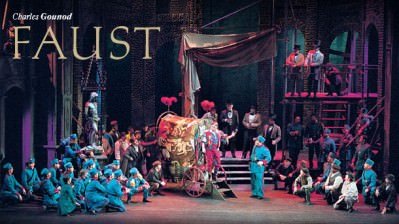Faust
Music by Charles Gounod
At Lyric Opera
Lyric’s Faust is Believably Human
Opportunity knocks only once, but temptation knocks again and again. And it keeps knocking until you finally go see who it is, only to find it is Mephistopheles, himself, at the door. While this may not happen (too often) in real life, it happens all the time in literature and is the opening scene of Charles Gounod’s Faust, now in production at the Lyric Opera.
Based on a French play that was based on Goethe’s Faust, the opera tells the classic tale of an old, washed up professor, Faust, who sells his soul for youth in order to pursue love with a local beauty. He then impregnates the starry-eyed girl, abandons her, and leaves her to sink into infanticidal madness, for which she is executed.
The hands-down star of this production is in the title role: Polish tenor Piotr Beczala radiates with his character’s ill-begotten youthful vigor but tempers it with moments of vile selfishness reminiscent of his previous life as a suicidal curmudgeon. He brings the audience along as he moves from antihero to hero back to antihero, mixing them along the way. His impeccable singing is equaled by his stellar stage presence and acting ability.
Though it is presumably a love story, the character we see opposite Faust most often is Mephistopheles, played by diabolic German bass René Pape—perfect for the role. Mr. Pape is sinister, comical, and conniving every moment on stage, and when he actually sings, his is the voice of an angel that has fallen from the sky, been beaten, dragged through the mud, turned evil, and then come out the other side with a wicked sense of humor. Every French opera should have a German as the Devil.
The object of Faust’s affection, Marguerite, is played by Ana María Martínez, born in Puerto Rico. Ms. Martínez is an incredibly gifted singer and has near-flawless technique. That being said, I did not see her losing herself in the music. She was not lacking in confidence but was somehow the opposite: self-consciously overconfident. She seemed more accustomed to concert performances than to staged productions; her overeager acting painted with broad strokes with only slight hints of nuance: ultimately unbelievable. Clearly, however, these opinions are my own, for she received some of the loudest ovations from the crowd and the critics alike.
In some Lyric performances, there is an unfortunate gap between the stars and the second tier., but what separates this performance from those is the quality of the supporting characters; Lucas Meachem drew thunderous applause—and deserved it—for his aria as the soldier Valentin, and Katherine Learner delivered a solid aria as she gets more comfortable with bigger roles. It would be nice, however, if Ms. Learner, playing a pants role, could learn to walk and act a bit more boyish to avoid confusing the audience with Sapphic overtones.
This production is the same as the one done by the Lyric in 2003, directed by Frank Corsaro. The sets are beautiful and realistic but give way to the mystery of eternity at the end. The direction is unobtrusive, original, and yet cohesive. It is not a complete recontextualization of the drama, but it is fresh and contemporary. The costumes are, in general, perfect for their character, although I felt that Marguerite’s costume and wig were borderline Amish. (My apologies to the Amish reading this on their computer.)
Overall, the production is highly effective. As a musician, I thoroughly enjoyed it, but it is also perfectly accessible to non-musicians who enjoy drama laced with comedy. I took a friend to the performance who is not a musician and has only seen a couple operas; she called Faust the best production she had seen, being blown away by the three leads and finding the story and music compelling. She may not have noticed musical minutia, like when Sir Andrew Davis and Mr. Pape disagreed on tempo for a whole phrase, but there is more to opera than music.
While it may be tempting to see Lyric Opera’s highly acclaimed production, you only have a small window of opportunity in which to see it—only until early November.
Recommended
Evan Kuchar
For more info and tickets: http://www.lyricopera.org, 312-332-2244
